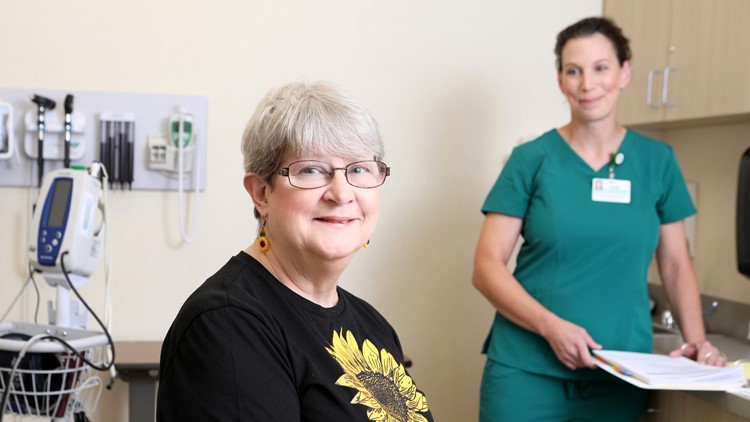WEST COLUMBIA, S.C. — Inside Lexington Oncology at Lexington Medical Center, breast cancer survivor Gayle Pugh and Certified Clinical Research Coordinator Kate Madden have a special bond.
Gayle has participated in three clinical trials for breast cancer treatment at Lexington Medical Center and Kate has been at her side every step of the way.
Gayle’s journey with breast cancer began in 2015 when she noticed a lump that she described as feeling like a ping pong ball in her left breast. The Northeast Columbia woman and Richland County Sheriff’s Department investigator was diagnosed with breast cancer that had spread to her lymph nodes on her 64th birthday. She underwent chemotherapy, a mastectomy, lymph node removal and radiation.
Then, doctors at Lexington Oncology and Lexington Radiation Oncology talked to Gayle about the opportunity to participate in clinical trials.
“We look for studies that we think will be a good fit for our patients and give them access to the latest and most promising therapies. Some of them are through our hospital’s oncology affiliation with Duke Health,” Kate said. “Most are nationally-funded Phase III trials and the Institutional Review Board at our hospital reviews them all to make everyone agrees they’re safe.”
Gayle has been participating in trials for the past four years.
“I knew they were doing every single thing they could to help me get back to normal. I knew they had my back 100 percent,” Gayle said.
The first trial sought to learn if women who had an excellent response to chemotherapy given before surgery could do just as well with less radiation afterward. When Gayle’s lymph nodes were removed, there was no cancer remaining in them. Normally, patients with cancer that has spread to lymph nodes receive extra radiation to that area after surgery. For patients like Gayle, chemotherapy eliminated all of the cancer in her lymph nodes, making her an ideal candidate for the trial.
“These women may not need all of the radiation usually given after surgery, so we do these kinds of studies to help answer those questions,” Kate said.
Some of the patients in the trial received the usual radiation, while others did not. Gayle had radiation.
The second trial looked at a medication that is often prescribed to patients with hormone positive breast cancer that has spread to other parts of the body. The goal was to see if the medicine could also help prevent cancer recurrence altogether in patients whose cancer had not spread. Gayle started the trial in 2016. To date, her cancer has not come back.
The third trial seeks to see if taking aspirin can help keep breast cancer from coming back. Gayle is currently participating in that trial, but because it’s a blinded study, she doesn’t know if she’s receiving aspirin or a placebo.
“I think Gayle exemplifies the patients who really want to give back and help others,” Kate said. “They’ll do whatever it takes – extra medicine, questionnaires, blood draws and visits -- to help advance our knowledge of cancer.”
In addition, Gayle comes to Lexington Oncology for follow-up about every four months. Kate and the clinical research team have coordinated Gayle’s whole experience with clinical trials.
“I feel great knowing I’m receiving the best care possible,” Gayle said. “It’s phenomenal. Life is all about choices. And I chose Lexington Medical Center. No regrets about that.”
In Kate’s work, she gets to know her patients well. Clinical trial participants are followed closely, sometimes for five to 10 years, creating many lasting friendships. In fact, Gayle and her husband Terry went to Kate’s wedding reception three years ago.
“Patients like Gayle put their trust in us to be part of these trials. It’s a great leap of faith,” Kate said. “A lot of people don’t realize how strong they are until they go through cancer.”
These days, Gayle and Terry enjoy fishing early in the morning, starting before sunrise.
“When we get on the water and the sun goes up, you can take the most beautiful pictures,” she said. “Someone asked me why I take so many pictures of sunrises. And I tell them, ‘If you’re ever diagnosed with cancer, you’ll realize how precious every new day is.’”



